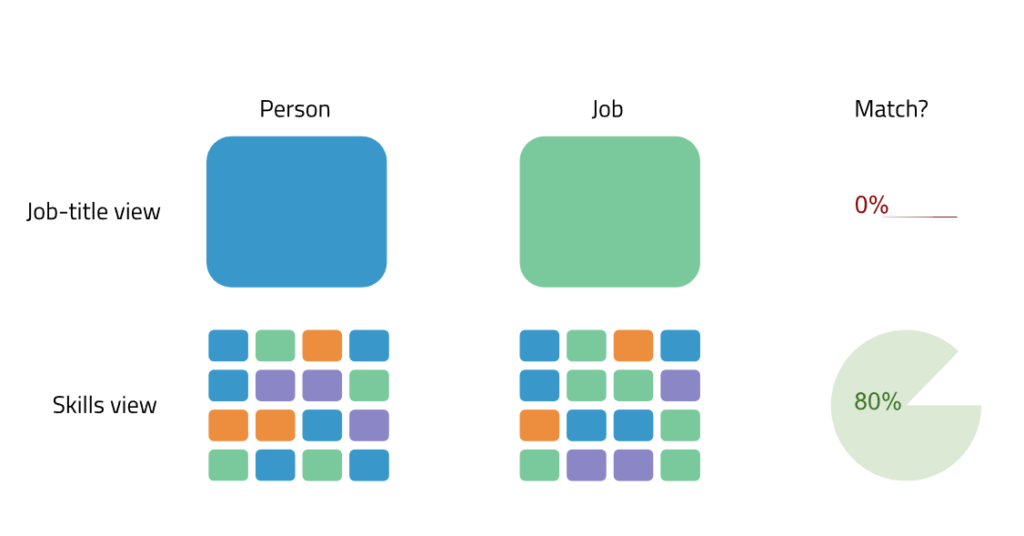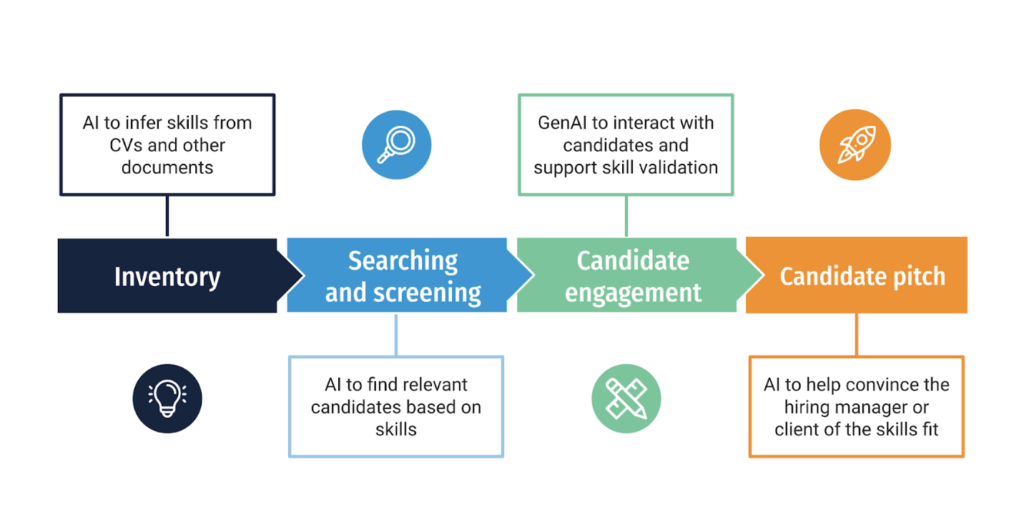How Generative AI necessitates skills-based recruitment and HR
The rise of AI can be seen as a new type of industrial revolution, shifting the boundaries between human and machine tasks across professional domains. Whereas previous revolutions had mainly impacted repetitive procedural tasks, the availability of GenAI systems now disrupts cognitive, social and creative work. The IMF recently estimated that about 40% of the jobs will be impacted by this technology.
As always in times of market disruption, organizations find themselves forced to rethink their strategic direction, and assess the ability of their workforce to execute on it. Impactful HR decisions are pivotal to an adequate response to AI-based automations, whether concerning external recruitment, internal mobility, layoffs or upskilling.
However, many organizations are held back by a narrow perspective on talent, categorizing individuals merely by their job titles. This pigeonholed approach obscures the actual competencies and responsibilities required. A more fruitful approach is to take people’s skills and learning potential as the starting point for recruitment and HR processes. In a recent study by Deloitte, 77% of business and HR executives agreed a skills-first approach is “critical to navigating future disruptions.”

How Generative AI facilitates skills-based recruitment and HR
Despite its obvious advantages, the adoption of skills-based recruitment faced both human and technological barriers. Recruiters and hiring managers are often unwilling to break through existing conventions, or simply lack the technological infrastructure to support skill-based workflows. This is where recent advances in AI will have a significant impact: GenAI and related technologies are lifting the quality of recruitment technology to a new level, bringing invaluable assistance at all stages of the skills-based hiring workflow.

1. AI parsing for creating a skills inventory
Solid document parsing technology is key to managing and optimizing the skills inventory within your organization or candidate pool. The latest generation of AI technology has endowed document parsers with a more context-aware, nuanced understanding of skills. Rather than just attributing a skill to a candidate in a yes-or-no manner, modern parsers are capable of representing more dimensions of skills. These include the candidate’s level of expertise, the work environment and industry in which a skill was applied, and the candidate’s learning preferences. This makes it possible to comprehensively identify and harmonize skills from various sources, including resumes, performance reviews, and project descriptions.
2. AI matching for skills-based sourcing
Having a skills inventory in place is the foundation for a core task in recruitment: the identification of relevant talent for a given role, or vice versa. A search engine that understands jobs and profiles in great depth is paramount to achieving good results.
One advantage of modern, (Gen)AI-based matching technology over traditional systems is that jobs descriptions can be understood in greater depth, including an assessment of the importance of the skills listed. For instance, generic skills like communications are often of less importance than other skills mentioned in a job ad. In addition, modern search tools can take candidate attributes into account that are not explicitly mentioned, such as industry knowledge, cultural fit indicators, or the steepness of their career path. Thus, the new generation of AI search engines help surface more relevant candidates than traditional ones, resulting in major time savings in sourcing and shortlisting.

3. Conversational AI for skill screening and assessment
To narrow down the pool of shortlisted candidates, recruiters often conduct brief phone or video interviews. These help to confirm the candidate’s interest in the position, clarify any questions, and validate the skills attested by their resume. To make screening conversations more scalable, AI-driven chatbots can partially take over by engaging with candidates through WhatsApp or text messages.
It won’t come as a surprise that GenAI technology greatly improves the ability of such chatbots to converse in a natural, human-like way. Just like ChatGPT, modern recruitment bots can show a profound understanding of what their conversation partner means to say, and generate contextually appropriate responses. When applied to skills-based recruitment, these bots can evaluate a candidate’s skill level through targeted interview questions, help understand the context in which a skill was applied, or inquire about a candidate’s desired learning path.
4. Generative AI for writing a skills-based candidate pitch
In old fashioned, title-oriented recruitment, presenting a candidate often simply meant highlighting the matching job title (e.g. “I found you a controller for your controller position”). In skills-oriented recruitment, where the job titles don’t always match, convincing stakeholders of the candidate fit can be harder. It requires more emphasis on the overlapping skills and learning potential of the candidate.
Gen-AI based writing tools can serve as a powerful ally in persuading stakeholders of the candidate’s suitability for a job. They can make the writing process much faster and easier, helping the recruiter to express a convincing, holistic view of the candidate.

Your next steps
In today’s volatile and increasingly AI-enhanced job market, any organization should be looking to adopt a deliberate talent strategy around skills, potential and learning. Resistance regarding process efficiency and the need for change management have the same answer: the selection of appropriate technological infrastructure for skills-based hiring. Whether your focus is on recruitment or talent management, the way forward is through a company-wide adoption of skills-based strategy, supported by the deployment of AI-powered technology.
So, to be successful in today’s dynamic recruitment landscape, talent teams need to adapt. And so does your HR technology. Textkernel is dedicated to harnessing the full potential of GenAI to revolutionize recruitment and HR. Find out more about our adoption and implementation of GenAI on this page. If you want to learn more about Skills Intelligence or if you’re interested in a free trial, be sure to check out our Skills Intelligence page.



